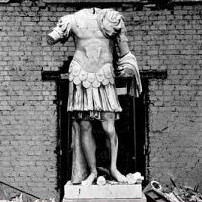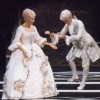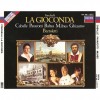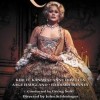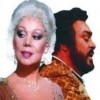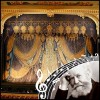Libretto
Edgar is an operatic dramma lirico in three acts (originally four acts) by Giacomo Puccini to an Italian libretto by Ferdinando Fontana, freely based on the play in verse La Coupe et les lèvres by Alfred de Musset. The first performance was given at the Teatro alla Scala in Milan on 21 April 1889.
Edgar, Puccini's second opera, was composed on a commission from the publisher Ricordi after the successful reception of his first stage work, Le Villi. The original version had four acts and was tepidly received. In January 1890, Ricordi published a revised version, including a different ending for Act II. In the autumn of 1891, Puccini revised the work again, cutting the last act and producing a three-act version which would again be revised in 1905.
In this final form the opera had even less success than in its original four-act structure. Some of the music that was cut in 1891 was reused in Tosca and became the beautiful Act III duet, "Amaro sol per te m'era il morire!". The funeral march from Act III was played at Puccini's funeral, conducted by Arturo Toscanini.
Parallels to Bizet's Carmen are numerous. Both operas feature a confused young man (tenor: Edgar, Don José) who is struggling to choose between the pure chaste love of his home town girl (soprano: Fidelia, Micaëla) and the consuming passion of an exotic gypsy (mezzo-soprano: Tigrana, Carmen).
Synopsis (three-act version)
Place: Flanders.
Act 1
Fidelia gives an awakening Edgar a sprig of almond blossoms, but leaves when she sees Tigrana approaching. Tigrana tries to tempt Edgar to return to their life of debauchery, but fails when Edgar avows he loves Fidelia's purity. Frank, who has always loved Tigrana, enters, but when he cannot win her affections, he berates her, and they argue.
After Tigrana mocks the villagers at prayer, they order her to leave the village. She retreats to Edgar's house, where he defends her from the angry crowd. He announces that he will go with her, and burns down his house before leaving. Frank attempts to stop them, and in a duel between him and Edgar, Frank is wounded. The villagers curse the fleeing lovers.
Act 2
Edgar has left the wild orgy in Tigrana's house. He is tired of his life of debauchery and longs to return to Fidelia. Tigrana comes to him to entice him back to the party, but, just as she is about to succeed, a platoon of soldiers arrives. Edgar is surprised that Frank is leading them, and asks for forgiveness. Frank grants it happily because the fight actually had broken the hold Tigrana had on him. To escape from Tigrana, Edgar joins the platoon, despite her pleading. Tigrana swears revenge as the men leave her.
Act 3
A large funeral procession carries the body of Edgar, who has fallen in battle. Frank and the crowd praise Edgar as a hero, but the monk who heard Edgar's dying confession denounces him. He reveals Edgar's sins and debauchery, and the crowd, easily swayed, curses Edgar. Only Fidelia stands up for Edgar and vows that she will meet him in heaven.
After the crowd leaves, Tigrana enters, crying. She is upset that no one will see her weeping for Edgar. Frank and the monk ask her to denounce Edgar, but she resists until they offer her jewels. The crowd returns. The monk claims that Edgar betrayed his country for some gold, and Tigrana reluctantly confirms this. The soldiers try to desecrate the body and discover it is only a suit of armor. The monk reveals that he is Edgar and goes to leave with Fidelia, the only one who remained true to him. The vengeful Tigrana stabs and kills Fidelia. Edgar weeps over the lifeless body as the soldiers capture Tigrana, and the crowd prays.





